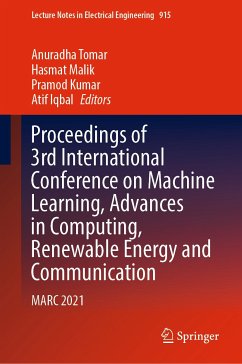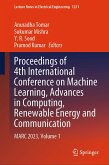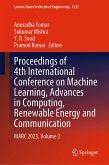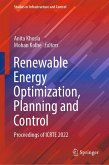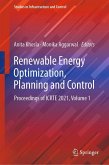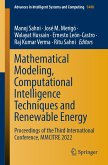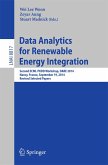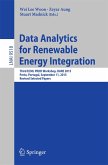Proceedings of 3rd International Conference on Machine Learning, Advances in Computing, Renewable Energy and Communication (eBook, PDF)
MARC 2021
Redaktion: Tomar, Anuradha; Iqbal, Atif; Kumar, Pramod; Malik, Hasmat
161,95 €
161,95 €
inkl. MwSt.
Sofort per Download lieferbar

81 °P sammeln
161,95 €
Als Download kaufen

161,95 €
inkl. MwSt.
Sofort per Download lieferbar

81 °P sammeln
Jetzt verschenken
Alle Infos zum eBook verschenken
161,95 €
inkl. MwSt.
Sofort per Download lieferbar
Alle Infos zum eBook verschenken

81 °P sammeln
Proceedings of 3rd International Conference on Machine Learning, Advances in Computing, Renewable Energy and Communication (eBook, PDF)
MARC 2021
Redaktion: Tomar, Anuradha; Iqbal, Atif; Kumar, Pramod; Malik, Hasmat
- Format: PDF
- Merkliste
- Auf die Merkliste
- Bewerten Bewerten
- Teilen
- Produkt teilen
- Produkterinnerung
- Produkterinnerung

Bitte loggen Sie sich zunächst in Ihr Kundenkonto ein oder registrieren Sie sich bei
bücher.de, um das eBook-Abo tolino select nutzen zu können.
Hier können Sie sich einloggen
Hier können Sie sich einloggen
Sie sind bereits eingeloggt. Klicken Sie auf 2. tolino select Abo, um fortzufahren.

Bitte loggen Sie sich zunächst in Ihr Kundenkonto ein oder registrieren Sie sich bei bücher.de, um das eBook-Abo tolino select nutzen zu können.
This book gathers selected papers presented at International Conference on Machine Learning, Advances in Computing, Renewable Energy and Communication (MARC 2021), held in Krishna Engineering College, Ghaziabad, India, during 10 - 11 December, 2021. This book discusses key concepts, challenges and potential solutions in connection with established and emerging topics in advanced computing, renewable energy and network communications.
- Geräte: PC
- ohne Kopierschutz
- eBook Hilfe
- Größe: 19.21MB
Andere Kunden interessierten sich auch für
![Proceedings of 4th International Conference on Machine Learning, Advances in Computing, Renewable Energy and Communication (eBook, PDF) Proceedings of 4th International Conference on Machine Learning, Advances in Computing, Renewable Energy and Communication (eBook, PDF)]() Proceedings of 4th International Conference on Machine Learning, Advances in Computing, Renewable Energy and Communication (eBook, PDF)202,95 €
Proceedings of 4th International Conference on Machine Learning, Advances in Computing, Renewable Energy and Communication (eBook, PDF)202,95 €![Proceedings of 4th International Conference on Machine Learning, Advances in Computing, Renewable Energy and Communication (eBook, PDF) Proceedings of 4th International Conference on Machine Learning, Advances in Computing, Renewable Energy and Communication (eBook, PDF)]() Proceedings of 4th International Conference on Machine Learning, Advances in Computing, Renewable Energy and Communication (eBook, PDF)202,95 €
Proceedings of 4th International Conference on Machine Learning, Advances in Computing, Renewable Energy and Communication (eBook, PDF)202,95 €![Renewable Energy Optimization, Planning and Control (eBook, PDF) Renewable Energy Optimization, Planning and Control (eBook, PDF)]() Renewable Energy Optimization, Planning and Control (eBook, PDF)226,95 €
Renewable Energy Optimization, Planning and Control (eBook, PDF)226,95 €![Renewable Energy Optimization, Planning and Control (eBook, PDF) Renewable Energy Optimization, Planning and Control (eBook, PDF)]() Renewable Energy Optimization, Planning and Control (eBook, PDF)169,95 €
Renewable Energy Optimization, Planning and Control (eBook, PDF)169,95 €![Mathematical Modeling, Computational Intelligence Techniques and Renewable Energy (eBook, PDF) Mathematical Modeling, Computational Intelligence Techniques and Renewable Energy (eBook, PDF)]() Mathematical Modeling, Computational Intelligence Techniques and Renewable Energy (eBook, PDF)193,95 €
Mathematical Modeling, Computational Intelligence Techniques and Renewable Energy (eBook, PDF)193,95 €![Data Analytics for Renewable Energy Integration (eBook, PDF) Data Analytics for Renewable Energy Integration (eBook, PDF)]() Data Analytics for Renewable Energy Integration (eBook, PDF)40,95 €
Data Analytics for Renewable Energy Integration (eBook, PDF)40,95 €![Data Analytics for Renewable Energy Integration (eBook, PDF) Data Analytics for Renewable Energy Integration (eBook, PDF)]() Data Analytics for Renewable Energy Integration (eBook, PDF)40,95 €
Data Analytics for Renewable Energy Integration (eBook, PDF)40,95 €-
-
-
This book gathers selected papers presented at International Conference on Machine Learning, Advances in Computing, Renewable Energy and Communication (MARC 2021), held in Krishna Engineering College, Ghaziabad, India, during 10 - 11 December, 2021. This book discusses key concepts, challenges and potential solutions in connection with established and emerging topics in advanced computing, renewable energy and network communications.
Dieser Download kann aus rechtlichen Gründen nur mit Rechnungsadresse in A, B, BG, CY, CZ, D, DK, EW, E, FIN, F, GR, HR, H, IRL, I, LT, L, LR, M, NL, PL, P, R, S, SLO, SK ausgeliefert werden.
Produktdetails
- Produktdetails
- Verlag: Springer Nature Singapore
- Seitenzahl: 781
- Erscheinungstermin: 17. September 2022
- Englisch
- ISBN-13: 9789811928284
- Artikelnr.: 65802569
- Verlag: Springer Nature Singapore
- Seitenzahl: 781
- Erscheinungstermin: 17. September 2022
- Englisch
- ISBN-13: 9789811928284
- Artikelnr.: 65802569
- Herstellerkennzeichnung Die Herstellerinformationen sind derzeit nicht verfügbar.
Dr. Anuradha Tomar has 12 years plus experience in research and academics. She is currently working as Assistant Professor in Instrumentation & Control Engineering Division of Netaji Subhas University, Delhi, India. Dr. Tomar has completed her Postdoctoral research in Electrical Energy Systems Group, from Eindhoven University of Technology (TU/e), the Netherlands and has successfully completed European Commission's Horizon 2020, UNITED GRID and UNICORN TKI Urban Research projects. She has received her B.E Degree in Electronics Instrumentation & Control with Honours in the year 2007 from University of Rajasthan, India. In the year 2009, she has completed her M.Tech Degree with Honours in Power System from National Institute of Technology Hamirpur. She has received her Ph. D in Electrical Engineering, from Indian Institute of Technology Delhi (IITD). Dr. Anuradha Tomar has committed her research work efforts towards the development of sustainable, energy efficient solutions forthe empowerment of society, humankind. Her areas of research interest are Operation & Control of Microgrids, Photovoltaic Systems, Renewable Energy based Rural Electrification, Congestion Management in LV Distribution Systems, Artificial Intelligent & Machine Learning Applications in Power System, Energy conservation and Automation. She has authored or co-authored 69 research/review papers in various reputed International, National Journals, and Conferences. She is an Editor for books with International Publication like Springer, Elsevier. She has also filled seven Indian patents on her name. Dr. Tomar is Senior member of IEEE, Life member of ISTE, IETE, IEI, and IAENG. Dr. Hasmat Malik received Diploma in electrical engineering from Aryabhatt Govt. Polytechnic Delhi, B.Tech degree in electrical engineering from Guru Gobind Singh Indraprastha University Delhi, M.Tech degree in electrical engineering from the National Institute of Technology (NIT) Hamirpur, India, and the Ph.D. degree in Electrical Engineering from Indian Institute of Technology (IIT), Delhi. He has served as an Assistant Professor for more than five years at the Division of Instrumentation and Control Engineering, Netaji Subhas Institute of Technology (NSIT), Dwarka Delhi, India. He is currently a Chartered Engineer (CEng) and a Professional Engineer (PEng). He is also Postdoctoral researcher with Berkeley Education Alliance for Research in Singapore (BEARS), (a research center of the University of California, Berkeley USA), university town, NUS Singapore, since January, 2019. He has published widely in international journals and conferences his research findings related to intelligent data analytics, artificial intelligence, and machine learning applications in power system, power apparatus, smart building & automation, smart grid, forecasting, prediction and renewable energy sources. Dr. Hasmat has authored and co-authored more than 100 research papers, nine booksand fifteen chapters, published by IEEE, Springer and Elsevier. He has supervised 25 PG students. His principal area of research interests is application of artificial intelligence, machine learning and big-data analytics for renewable energy, smart building & automation, condition monitoring and online fault detection & diagnosis (FDD). Dr. Malik is also a Fellow of the Institution of Electronics and Telecommunication Engineering (IETE), a Senior Member of the IEEE, and a member of the Institution of Engineering and Technology (IET), UK, the Computer Science Teachers Association (CSTA), the Association for Computing Machinery (ACM) EIG, a Life Member of the Indian Society for Technical Education (ISTE), the Institution of Engineers (IEI), India, the International Society for Research and Development (ISRD), London, and Mir Labs, Asia. He received the POSOCO Power System Award (PPSA-2017) for his Ph.D. work for research and innovation in the areaof power systems. He also received the best research papers awards from IEEE INDICON-2015, and the Full Registration Fee Award from IEEE SSD-2012, Germany. Prof (Dr.) Pramod Kumar is working as Professor, Head (CSE) & Dean (CSE & IT) in Krishna Engineering College, Ghaziabad since January 2018. He also served as Director of the Tula's Institute, Dehradun, Uttarakhand. He has more than 22 years of experience in academics. He completed his Ph.D in Computer Science & Engineering in 2011 and M.Tech (CSE) in 2006. He is a senior member of IEEE (SMIEEE) and Joint Secretary of IEEE U.P Section. He has published widely in International Journals and Conferences his research finding related to Computer Network, Internet of things(IoT) and Machine Learning.He has Authored/Co-Authored more than 70 research papers and several Chapters in edited books. He has supervised and co-supervised several M.Tech and Ph.D students. He has organized more than 10 IEEE International Conferences and all the research paper of these conferences is now available in IEEE Explore. He is the editor of two books. He has conducted more than 15 Faculty Development Program in the collaboration of EICT, IIT Roorkee, EICT, IIT Kanpur and AKTU. He has organised IEEE National workshop on Research Paper writing on 27 March 2017 and IEEE Women Symposium on 21 Feb 2016. Prof. Atif Iqbal (Senior Member, IEEE, Fellow IET, Fellow IE) received the B.Sc. and M.Sc. degrees in engineering (power system and drives) from Aligarh Muslim University (AMU), Aligarh, India, in 1991 and 1996, respectively, and Ph.D. degree from Liverpool John Moores University, Liverpool, U.K., in 2006, and the D.Sc. degree (Habilitation) in control, informatics, and electrical engineering from the Gdansk University of Technology, in 2019. He is a Full Professor with the Department of Electrical Engineering, Qatar University, Doha, Qatar, and a former Full Professor with the Department of Electrical Engineering, AMU, Aligarh, India. He has been a Lecturer with the Department of Electrical Engineering, AMU, since 1991, where he has served as a Full Professor, until August 2016. Dr. Iqbal has been listed in top 2% highly cited scientists of the world (data released by Stanford University, USA). The world ranking in 2019 was #649 and the current ranking is #622. He has published widely in international journals and conferences on his research findings related to power electronics, variable speed drives, and renewable energy sources. He has authored or coauthored more than 520 research articles and four books and several chapters in edited books. He has supervised several large research and development projects worth more than multimillion USD. He was a recipient of the Maulana Tufail Ahmad Gold Medal for standing first at the B.Sc.Engg. (Electrical) Exams from AMU, in 1991. He was also a recipient of the Outstanding Faculty Merit Award academic year 2014-2015 and the Research Excellence Awards at Qatar University, in 2015 and 2019. He has received several best research papers awards, e.g., at IEEE ICIT-2013, IET-SEISCON-2013, SIGMA 2018, IEEE CENCON 2019, IEEE ICIOT 2020, ICSTEESD-20, Springer ICRP 2020, IEEE GUCON 2021. He has also received the Gold Medal for his B.Sc. degree. He is the Vice-Chair of the IEEE Qatar Section. He is also an Associate Editor of the IEEE Transactions on Industrial Electronics and IEEE Access and the Editor-in-Chief of the Journal of Electrical Engineering (I'manager). He was a former Associate Editor of the IEEE Transactions on Industry Application and a former Guest Associate Editor IEEE Transactions on Power Electronics. He is head of the design team of Power Electronics and Drives equipment at Powerlab Instruments, Chennai, India His research interests include smart grid, complex energy transition, active distribution network, electric vehicles drivetrain, sustainable development and energy security, distributed energy generation, and multiphase motor drive systems.
A deep drive into knowledge management for improv-ing software process and product: Visions and Research Directions.- An Area and Delay Efficient Approximate Hybrid Adder for VLSI Circuit Designs.- Health Care System with IoT Wireless Sensor Network.- Comparative Analysis of Face Mask Detection Model.- Analytical Approach towards Face Mask Detection using Artificial Intelligence Techniques.- Kubernetes and Docker the Star Duo of Container Culture.- A Robust Gender Identification System for Speaker Recognition using Linear Discriminant Analysis Stepwise Dimension Reduction.- Parallel Agglomerative Hierarchical Clustering algorithm implementation with Hadoop Map-reduce.- Authentication and key update in Satellite communication.- Intelligent Approaches for Disease Diagnosis, Prevention and Treatment.- Review of Sentiment Analysis on Covid19 and Lockdown Twitter Data: Novel Techniques.- Supervised Machine Learning approach for Crack Detection in Digital Images.- The use of LSTM Models forWater Demand forecasting and analysis.- A Genetic Algorithm Framework to Solve Two-Dimensional Maze Problem.- A Bibliometric Analysis of Anomaly Detection for IoT Enabled Smart Cities.- A Comprehensive Performance Evaluation of Novel Big Data Log Analytic Framework.- Polarities Inconsistency of MOOC Courses Reviews Based on Users and Sentiment Analysis Methods.- Forest Fire Detection and Prevention System using IoT.- Sustainable IT And Energy Management For Metropolis Substructure Expansion.- Data classification using various machine learning algorithms.- A survey of the workload forecasting methods in cloud computing.- Web Usage Mining Cluster Simulation Using K-Means and Fuzzy Approach.- Reduction of IoT security vulnerabilities using Machine learning algorithm.- A Novel Voltage Level-Up shifter Design for Power Efficient Methods Using Dual Current Mirror Technique.- Efficient Cloud Orchestration Services in Computing.- Efficient Data Aggregation in Wireless Sensor Network Cluster Based Solution.- A Greedy Jellyfish Search Optimization Algorithm.
A deep drive into knowledge management for improv-ing software process and product: Visions and Research Directions.- An Area and Delay Efficient Approximate Hybrid Adder for VLSI Circuit Designs.- Health Care System with IoT Wireless Sensor Network.- Comparative Analysis of Face Mask Detection Model.- Analytical Approach towards Face Mask Detection using Artificial Intelligence Techniques.- Kubernetes and Docker the Star Duo of Container Culture.- A Robust Gender Identification System for Speaker Recognition using Linear Discriminant Analysis Stepwise Dimension Reduction.- Parallel Agglomerative Hierarchical Clustering algorithm implementation with Hadoop Map-reduce.- Authentication and key update in Satellite communication.- Intelligent Approaches for Disease Diagnosis, Prevention and Treatment.- Review of Sentiment Analysis on Covid19 and Lockdown Twitter Data: Novel Techniques.- Supervised Machine Learning approach for Crack Detection in Digital Images.- The use of LSTM Models forWater Demand forecasting and analysis.- A Genetic Algorithm Framework to Solve Two-Dimensional Maze Problem.- A Bibliometric Analysis of Anomaly Detection for IoT Enabled Smart Cities.- A Comprehensive Performance Evaluation of Novel Big Data Log Analytic Framework.- Polarities Inconsistency of MOOC Courses Reviews Based on Users and Sentiment Analysis Methods.- Forest Fire Detection and Prevention System using IoT.- Sustainable IT And Energy Management For Metropolis Substructure Expansion.- Data classification using various machine learning algorithms.- A survey of the workload forecasting methods in cloud computing.- Web Usage Mining Cluster Simulation Using K-Means and Fuzzy Approach.- Reduction of IoT security vulnerabilities using Machine learning algorithm.- A Novel Voltage Level-Up shifter Design for Power Efficient Methods Using Dual Current Mirror Technique.- Efficient Cloud Orchestration Services in Computing.- Efficient Data Aggregation in Wireless Sensor Network Cluster Based Solution.- A Greedy Jellyfish Search Optimization Algorithm.
